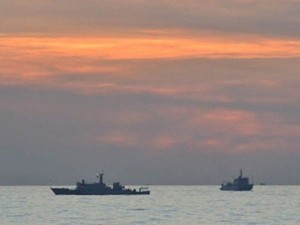Use of water cannons not covered by any law, says expert

This undated handout photo taken by the Philippine Navy and released April 11, 2012, by the Department of Foreign Affairs shows Chinese surveillance ships off Panatag (Scarborough) Shoal. AFP FILE PHOTO
MANILA, Philippines — The use of water cannons to drive away other ships is a fairly new practice and its use alone is something that is not covered by any international law or rule, a maritime law expert said Wednesday.
The tactic has been highlighted after a Chinese Coast Guard (CCG) vessel used water cannons against two Filipino fishing boats in Bajo de Masinloc (Panatag or Scarborough shoal) last January to drive them away and prevent them from fishing in the shoal.
“It’s a fairly new practice. Definitely no law or rule prohibits it expressly,” Jay Batongbacal, director of the University of the Philippines’ Institute for Maritime Affairs and Law of the Sea, said in a text message to INQUIRER.net when sought for comment about the use of water cannons with regards to international law.
“No sanctions or a penalty as long as it does not result in damage or injury,” he said.
The use of water cannons to drive away Filipino fishermen is considered by the Department of Foreign Affairs (DFA) as an “act of harassment.”
In a press conference Tuesday, DFA said that it “strongly protests the acts of harassment” against Filipino fishermen last January 27 and that it has submitted a written protest to the Charge d’Affaires of the Chinese Embassy.
“The CCG vessel continuously blew its horn and thereafter doused the fishing vessels with water cannons for several minutes,” Hernandez said.
In the past years, Japanese and Taiwanese coast guard vessels have repeatedly used water cannons against each other near the disputed Senkaku or Diaoyu Islands in the water off the coast of eastern China.
“Water cannons are a step up from signals and maneuvers. It’s still considered non-lethal and mainly for show, although of course it poses a danger to small vessels that might get inundated,” Batongbacal said.
“But it’s very short-ranged in its effectiveness; water cannons are designed for fire-fighting, not for warding off vessels,” he said.
Commercial cargo vessels equipped with water cannons have been known to use it against pirates attempting to come close to board the ship.
The DFA said that there have been nine other incidents of harassment by the CCG against Filipino fishermen in 2013 although the January 27 water cannon incident was the first report of such an act.
“Even during inclement weather conditions, Philippine fishing vessels were driven away from the area,” Hernandez said.
Chinese Embassy spokesman Zhang Hua however rejected the protest of the Philippines and maintained that the shoal is part of its “indisputable claim” in the South China Sea.
Panatag Shoal is 220 kilometers off Luzon island and around 650 kilometers from Hainan province, the nearest major Chinese landmass.
The United Nations Convention on the Law of the Sea mandates a 200 nautical mile exclusive economic zone from a nation’s coast where it has the sole right to exploit the resources within.
RELATED STORIES
PH protests China water cannon attack
Water cannon incident doesn’t merit military response—AFP














